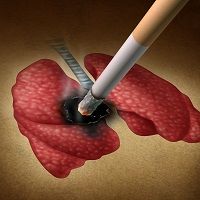Article
Life-Threatening Bacteria Becomes More Resistant, Thanks to Cigarette Smoke
Author(s):
Adding to the seemingly endless list of health problems, researchers from the University of California, San Diego School of Medicine found that cigarette smoke is to blame for making a deadly bacteria even worse.

Adding to the seemingly endless list of health problems, researchers from the University of California, San Diego School of Medicine found that cigarette smoke is to blame for making a deadly bacteria even worse.
Methicillin-resistant Staphylococcus aureus (MRSA), a superbug that is resistant to antibiotics, can cause pneumonia and life-threatening skin, bloodstream, and surgical site infections. Senior Author Laura E. Crotty Alexander, MD, and her colleagues discovered when MRSA is exposed to cigarette smoke, it hurts the immune system’s chances of fighting off the bacteria even more.
“Cigarette smokers are known to be more susceptible to infectious diseases,” Crotty Alexander, a pulmonologist, said in a news release. “Now we have evidence that cigarette smoke-induced resistance in MRSA may be an additional contributing factor.”
The team infected 2 groups of immune cells, macrophages, with MRSA. While one group was allowed to grow normally, the other was exposed to cigarette smoke extract.
The experiment, published in Infection & Immunity, revealed that the group that grew with the cigarette smoke extract had a harder time killing the bacteria. Important bacteria-fighting components of the immune system, like reactive oxygen species and antimicrobial peptides, had more difficulty when trying to get rid of the smoke-exposed macrophages.
“We already know that smoking cigarettes harms human respiratory and immune cells, and now we’ve shown that, on the flipside, smoke can also stress out invasive bacteria and make them more aggressive,” Crotty Alexander, who is also an assistant clinical professor of medicine at UC San Diego and staff physician at the Veterans Affairs San Diego Healthcare System, said.
The authors went a step further and found that not only are the MRSA smoke-exposed macrophages more resistant, but they were more successful in invading human cells and attaching themselves. This continued for 24 hours following the initial exposure.
Furthermore, the study showed that the more cigarette smoke extract that was used, the more resistant MRSA became. This suggests that there is a link between how much an individual smokes and their immune system’s ability to kill the bacteria.
“We conclude that cigarette smoke-induced immune resistance phenotypes in MRSA may be an additional factor contributing to susceptibility to infectious disease in cigarette smokers,” the study declared.


